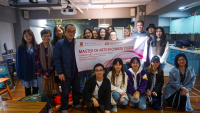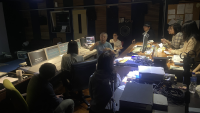|
||
|
||
|
| |||
| 11. 05. 2020 | ISSUE 6 | ||
|
| |||
| Field Trip Reports | |||||||||
|
MA Field Trip to Taiwan (Chinese Arts and Culture Stream)
By Pang Shiqi From December 12 to 17, 2019, I joined other MA students in the Chinese Arts and Culture stream on a field trip to Taiwan. Different from ordinary sightseeing tours, this field trip with professors and classmates gave me the opportunity to communicate personally with many prominent filmmakers, members of film festival juries, and scholars, who shared their own filmmaking experiences, arts appreciation, and insights into the film market. For a movie fan like me, this trip was a very impressive and meaningful exploration of the charm of film studies in Taiwan. Our first stop was the Taiwan Film Institute, where its director, Wang Chun-chi, welcomed us and delivered a talk on the development of Taiyupian (Taiwanese language films) from the perspective of transnational cinema. Her introduction provided an overall framework that guided our study of Taiwan cinema over the next few days. I was struck by Wang’s argument that from 1955 to 1970, Taiwanese language films were mostly shot in real locations and can be regarded as documentaries of contemporary society. It reminded me of the approach I learned in the Perspectives on Chinese Studies course, which combines artistic appreciation with social and cultural background. In my opinion, film as an art form reflects the social culture of the period when it is created, and the connection between art and society is inseparable. We also met with Yee Chih-yen, a famous scriptwriter-director who similarly values the relationship between film and reality. His emphasis on in-depth research into the people, social contexts and institutions that feature in his films opened a new door to my understanding of filmmaking. Yee believes that the more individual stories a director touches upon, the more he can find the universality of contradiction in the uniqueness of individuals. This then helps one to create a story that resonates strongly with audiences. Thanks to Yee’s sharing about his filmmaking process, many of us have a deeper appreciation of the relationship between the director’s intention and the audience’s interpretation. To my great surprise, we even had the honor of meeting the famous film editor Liao Ching-song and the celebrated sound designer Tu Duu-Chih. Both are masters in the field of Chinese-language filmmaking. Liao’s qiyun (氣韻, spirit resonance) editing method impressed me profoundly. He stressed that when editing, we should respect the film instead of controlling it, so that we can draw inspiration from it. In his view, editing needs to make the director invisible so that the audience can better empathize with the film as if they were in the story. Tu Duu-Chih showed us how to do sound design in his 3H Sound Studio. He prefers that the director not be present when he designs the sound for a film. He worries that the director will lower the sound requirements because he knows what it is like on the set and how difficult sound designing will be. However, if the director is not around, Tu will be able to achieve the effects he wants to present to the director, who may not have expected the sound design to be so amazing. I think the spirit of holding oneself to the highest standard is what makes the masters stand out from the crowd. The words of Liao and Tu have given me great courage and power to challenge myself. Only by constantly pushing ourselves can we realize our value to the world and obtain a rewarding sense of achievement. Many other memorable guests made an appearance in our packed schedule. Two famous Taiwanese actresses, Lee Chien-na and Vega Tsai, explored the relationship between film acting and real-life based on their own experiences. Wood Lin and Wu Fan introduced the development of documentary in Taiwan from the perspective of programming for Taiwan International Documentary Film Festival. We also visited Tsai Ming-liang’s site-specific exhibition and learned how to interpret it through the combination of sensibility and rational thinking from Sing Song-yong, a moving-image art scholar. Li Ya-Mei, the director of Taipei Film Festival, highlighted the significant impact of intellectual property sequels and regional cultural barriers in her analysis of key factors in the success of high-grossing films in the Taiwanese market. On the last day, we visited the screening room of the Golden Horse Awards, where we were introduced to the awarding system and aesthetic criteria by Wen Tien-Hsiang, CEO of the Golden Horse Film Festival. Looking back on the six-day field trip, we not only gained a more comprehensive understanding of Taiwan cinema and improved our academic research ability, but also a greater affection for our professors and cohorts as we walked through the streets of Taipei and experienced the local cuisine and cultural customs. Moreover, this trip has inspired me to keep challenging myself to be perfect, especially after meeting and interacting with so many people who always challenge themselves in their own professions. MA Field Trip to Taiwan (Issues in Contemporary China Stream)From December 9 to 14, 21 students in the Issues in Contemporary China stream travelled to Taiwan with Dr. Tim Summers for their Chinese Studies Fieldtrip course. Their footsteps spanned across three cities – Taipei, Tainan and Kaohsiung – and their scheduled activities included visits to museums and historical sites, lectures on Taiwanese history, politics and external relations, as well as exchanges with local university students. Before embarking on the trip, students made use of the fall semester to read literature about Taiwan. Based on their own interests, they designed research questions and plans for their field trip reports, to be completed after the visit. Some popular topics chosen by students were cross-strait relations and issues of identity. Zheng Danyu, one of our students, appreciated that the trip made words from her readings come alive, and the local social knowledge she acquired through the diverse activities. She also gained a firmer grasp on “how Taiwan became the current Taiwan” through interactions with locals. As Danyu engaged with the younger generation and began to understand their mindsets and thoughts, each chance for communication brought her new inspiration for her personal research project. For some, like American student Sarah Prothero, the field tip was not only “a major highlight of [her] experience in the Chinese Studies MA Programme at CUHK”, but also her “first opportunity to visit Taiwan”. Sarah found the visit to Tamkang University in Taipei to be especially memorable because it offered her a chance to “have a group discussion with the students there and learn first-hand about the opinions of Taiwanese young people on Taiwanese politics, the upcoming [presidential] elections, cross-strait relations, and Taiwanese identity.” Another student, Miao Chunzi, also found the discussions with local students and scholars to be the highlight. Chunzi recalled that she was “most impressed by the experience at National Sun Yat-sen University [in Kaohsiung], where Professor Shin Chueiling’s lecture titled ‘One Taiwan, Many Facts’ gave us a comprehensive understanding of Taiwan. She answered my questions at length, giving me a new understanding of the relationship between democracy and identity in Taiwan. We also had chances to have discussions with the local students. It helped us quickly build up a structure of knowledge about Taiwanese society and politics within a short period of time.” |
|
||||||||
|
|
|||||||||
|
|
Past Issue
| |
|
|
|
|
|








.jpg)
.jpg)